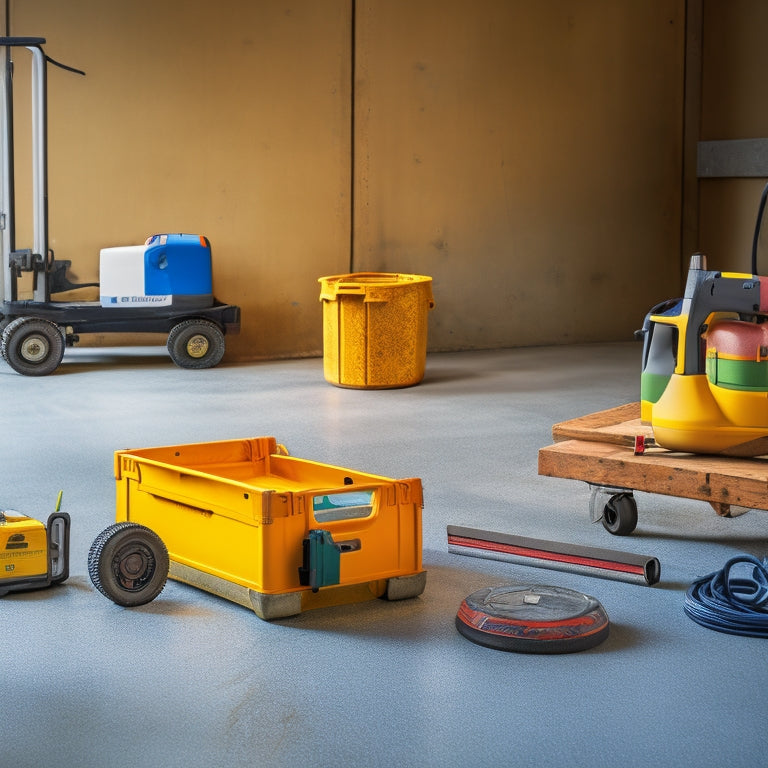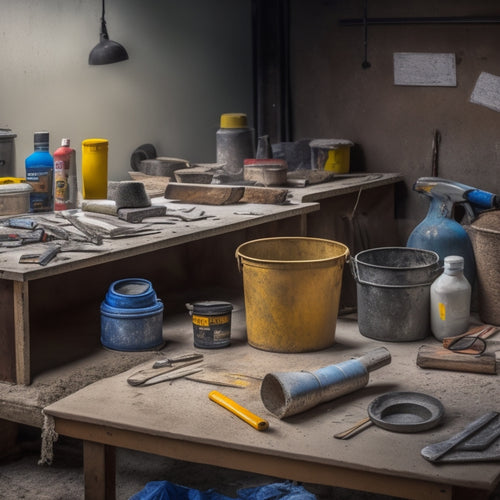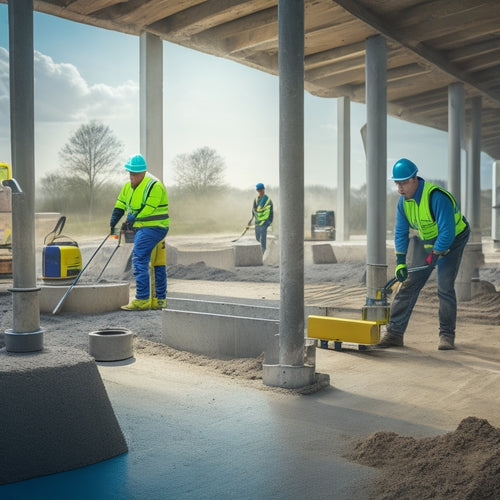
What Are the Best Tools for Concrete Leveling
Share
You'll need an extensive array of specialized tools to guarantee accurate and efficient concrete leveling, including laser level devices that detect slight deviations, high-precision leveling rods that deliver accurate elevation readings, and advanced scanning tools that utilize GPR and EMP technology to identify subsurface features. You'll also require spirit level options, easy-to-read measurement scales, and durable construction for spirit levels. As you explore the world of concrete leveling, you'll discover that each tool plays a vital role in achieving professional-grade results - and there's more to explore in this complex process.
Key Takeaways
• High-precision leveling rods and laser level devices are essential for accurate concrete leveling, detecting slight deviations with high accuracy.
• Advanced concrete scanning tools like GPR and EMP technology help locate subsurface features, identifying rebar, conduits, and obstacles for precise leveling.
• Spirit level options from reliable brands like Stabila, Empire, and Kapro provide precise angle measurements, ensuring accurate readings with regular calibration.
• Durable construction and easy-to-read measurement scales are crucial features of accurate digital level tools, which offer automatic or manual calibration options.
• Concrete block leveling machines and precision automatic levels automate the leveling process, improving efficiency and minimizing errors for high-volume tasks.
Top-Notch Laser Level Devices
When precision matters, you rely on first-rate laser level devices to guarantee accurate concrete leveling, as these tools offer unparalleled reliability and speed in detecting even the slightest deviations from the desired plane.
These devices come in various laser level types, including line lasers, dot lasers, and rotary lasers, each with its unique features and applications. Line lasers, for instance, project a level line onto a surface, making them ideal for tasks that require a high degree of accuracy, such as installing cabinets or shelves. Dot lasers, on the other hand, project a single point onto a surface, making them suitable for tasks that require precise leveling, such as setting foundations or poured walls.
When selecting a laser level device, you should consider key leveling device features, including accuracy, range, and durability. Look for devices with high accuracy, typically ±1/16 inch at 100 feet, to ascertain precise leveling.
Consider the range of the device, as some models can project a beam up to 1,000 feet. Finally, choose a device that's built to withstand harsh job site conditions, with features like dust and water resistance.
High-Precision Leveling Rods
When you're working with high-precision leveling rods, you can trust that you'll get accurate elevation readings every time.
You'll want to contemplate the rod's material and durability, as these factors directly impact its performance and lifespan.
Accurate Elevation Readings Guaranteed
You can rely on high-precision leveling rods to deliver accurate elevation readings, making sure that your concrete leveling projects start on a solid foundation. These rods undergo rigorous elevation calibration, guaranteeing precise measurements that eliminate errors. With high-precision leveling rods, you can trust the accuracy of your readings, which is essential for achieving a level surface.
To achieve accurate elevation readings, you'll need to employ advanced measurement techniques. High-precision leveling rods come equipped with specialized sensors that detect even the slightest changes in elevation. These sensors work in tandem with sophisticated algorithms to provide precise readings, even in challenging environments. By combining these advanced measurement techniques with the rod's precision engineering, you'll be able to capture accurate elevation data with ease.
When working on concrete leveling projects, accuracy is key. High-precision leveling rods provide the precision you need to guarantee a successful project. By relying on these rods, you'll be able to identify even the slightest deviations from the desired elevation, allowing you to make precise adjustments and achieve a perfectly level surface.
Rod Material and Durability
Two key factors that contribute to the exceptional performance of high-precision leveling rods are their robust material selection and rigorous durability testing.
When selecting a rod, you'll want to prioritize materials that can withstand harsh job site conditions, such as extreme temperatures, physical stress, and exposure to chemicals. Look for rods made from high-quality, corrosion-resistant materials like stainless steel or fiberglass. These materials will guarantee your rod remains accurate and reliable over time.
Durability testing is also essential in evaluating a rod's performance. You should opt for rods that have undergone rigorous testing, such as drop tests, vibration tests, and environmental tests. This guarantees that your rod can withstand the demands of concrete leveling projects.
Remember, a rod that can't withstand rough handling or harsh conditions is more likely to provide inaccurate readings, which can be costly and time-consuming to correct.
Easy-to-Read Measurement Scales
High-precision leveling rods feature easy-to-read measurement scales that enable accurate and efficient readings, even in low-light conditions or from a distance. This is particularly important when working with concrete leveling, where precise measurements are essential to achieving ideal results. You'll appreciate the clarity and simplicity of these scales, which allow you to focus on the task at hand without getting bogged down in complex measurement techniques.
When selecting a leveling rod, look for one that meets industry-standard leveling standards, such as those set by the American Society for Testing and Materials (ASTM). This guarantees that your measurements are consistent and reliable, regardless of the specific tool you're using.
Additionally, consider rods with measurement scales that are resistant to wear and tear, as well as those with built-in protections against environmental factors like moisture and extreme temperatures. By choosing a high-quality leveling rod with an easy-to-read measurement scale, you can streamline your workflow and achieve professional-grade results with confidence.
Advanced Concrete Scanning Tools
As a contractor, you know the importance of accurately locating subsurface features before starting a concrete leveling project. Concrete scanning tools equipped with ground-penetrating radar (GPR) and electromagnetic pulse (EMP) technology allow contractors to non-invasively locate rebar, conduits, and other subsurface features with precision. This advanced concrete imaging technology provides detailed subsurface analysis, enabling you to identify potential obstacles and plan your project accordingly.
Here's a comparison of some popular concrete scanning tools:
| Tool | Technology | Depth Penetration |
|---|---|---|
| RadarScan | GPR | Up to 12 inches |
| ConcreteCam | EMP | Up to 18 inches |
| ScanMaster | GPR + EMP | Up to 24 inches |
| SubSurfacePro | GPR | Up to 15 inches |
| DepthSensor | EMP | Up to 10 inches |
These advanced tools provide high-resolution images of the subsurface, allowing you to identify rebar, conduits, and other features with ease. By using concrete scanning tools, you can avoid costly mistakes, reduce project downtime, and guarantee a successful concrete leveling project.
Best Spirit Level Options
When it comes to spirit levels, you need tools that can provide precise angle measurements and withstand the demands of concrete leveling.
You'll want to look for spirit levels that offer accurate angle measurement, ensuring your surfaces are perfectly aligned.
Accurate Angle Measurement
You'll need a reliable spirit level to affirm accurate angle measurement, and high-quality models from trusted brands like Stabila, Empire, and Kapro offer unparalleled precision and durability.
When it comes to angle measurement techniques, a spirit level is an essential tool for guaranteeing that your concrete surface is level and even. To get accurate readings, it's vital to calibrate your measuring tool regularly. This involves checking the level against a known reference point, such as a precision-machined surface or a calibration plate. By doing so, you can trust that your spirit level is providing accurate readings, which is critical for achieving a perfectly level concrete surface.
When selecting a spirit level, look for models with high-quality vials that provide clear, easy-to-read markings. Some spirit levels also feature adjustable vials, which allow you to fine-tune the level to compensate for slight deviations in the surface.
Additionally, consider a level with a magnetic base or a clamp, which enables you to attach it securely to metal or other surfaces, affirming that your measurements are stable and accurate.
Durable Construction Design
To guarantee your spirit level withstands the rigors of concrete leveling, look for designs that feature durable construction, such as ruggedized housings, shock-absorbing end caps, and precision-machined components that can resist harsh job site conditions.
This guarantees your tool can withstand drops, bumps, and exposure to the elements, maintaining its accuracy and reliability.
When selecting a spirit level, you should prioritize durable construction that utilizes sustainable materials, reducing the risk of environmental impact while promoting structural integrity.
Look for levels with a ruggedized design, featuring reinforced materials that can absorb shocks and vibrations.
Additionally, opt for models with precision-machined components, guaranteeing accurate readings and minimizing the risk of mechanical failure.
Accurate Digital Level Tools
Digital level tools have revolutionized the concrete leveling process by providing accurate and precise measurements, allowing you to quickly identify even the slightest deviations from the desired plane. With advanced digital calibration techniques, these tools guarantee that your measurements are reliable and consistent. Additionally, many digital level tools come with leveling software applications that enable you to analyze and visualize your data, making it easier to identify areas that require adjustment.
Here are some key features to take into account when selecting a digital level tool:
| Feature | Description | Benefit |
|---|---|---|
| Accuracy | Measures deviations in degrees or fractions of an inch | Guarantees precise leveling |
| Calibration | Automatic or manual calibration options | Guarantees reliable measurements |
| Software | Leveling software applications for data analysis | Enables data visualization and analysis |
| Battery Life | Long-lasting battery life for extended use | Reduces downtime and increases productivity |
| Durability | Rugged design and construction for harsh environments | Withstands rough handling and extreme conditions |
Concrete Block Leveling Machines
Concrete block leveling machines, designed for high-volume leveling tasks, step in where digital level tools may fall short, providing a more efficient and labor-saving solution for large-scale concrete projects. These machines are ideal for leveling various concrete block types, such as hollow blocks, solid blocks, and insulated concrete blocks.
By automating the leveling process, you can complete tasks faster and with greater accuracy, guaranteeing a level surface for your concrete slabs or foundations.
When choosing a concrete block leveling machine, consider the leveling techniques you'll be using most often. Will you be working with a laser-guided system or a mechanical leveling system? Do you need a machine that can handle complex leveling tasks or simple ones? Different machines cater to different needs, so it's vital to select one that aligns with your specific requirements.
With a concrete block leveling machine, you'll be able to complete large-scale projects efficiently and effectively. By streamlining the leveling process, you'll reduce labor costs, minimize errors, and guarantee a high-quality finish.
Whether you're working on a commercial or residential project, a concrete block leveling machine is an invaluable tool to have in your arsenal.
Precision Automatic Levels
When you're working on a concrete leveling project, you know that accuracy is essential.
You need to guarantee that your surfaces are perfectly level, and that's where precision automatic levels come in - these tools will help you achieve the exacting standards you require.
With their advanced sensors and automatic grade control, you can trust that your work will meet the highest standards of quality.
Leveling Accuracy Matters
You'll achieve accurate leveling results only if you use precision automatic levels that can detect even the slightest deviations from the desired grade. This is essential, as even minor inaccuracies can lead to costly rework, compromised structural integrity, and safety hazards.
To guarantee accurate leveling, you need to employ reliable measurement standards and advanced leveling techniques.
Here are some key benefits of precision automatic levels:
-
High-precision measurement: Detects deviations as small as 0.01 mm
-
Automatic calibration: Eliminates human error and guarantees consistent results
-
Real-time data: Provides instantaneous feedback for swift adjustments
-
Durability: Withstands harsh job site conditions and rugged handling
-
Ease of use: Intuitive interfaces and minimal training requirements
Automatic Grade Control
By incorporating Automatic Grade Control, a high-tech system that integrates precision automatic levels with machine control systems, you can greatly enhance the accuracy and efficiency of your concrete leveling projects. This advanced technology allows for automatic calibration, eliminating the need for manual adjustments and reducing the risk of human error.
With Automatic Grade Control, you can guarantee that your concrete leveling machine is always operating at the best grade, resulting in smoother, more even surfaces. The system's sensor integration enables real-time monitoring of the machine's position and grade, providing you with instant feedback and allowing for swift corrections.
This level of precision and control enables you to tackle complex projects with confidence, knowing that your machine is working accurately and efficiently. By automating the grading process, you can reduce labor costs, increase productivity, and improve overall project quality.
With Automatic Grade Control, you can take your concrete leveling projects to the next level, delivering exceptional results that meet the highest standards.
High-Precision Sensors Needed
What sets precision automatic levels apart from traditional leveling tools is their ability to provide highly accurate readings, even in the most demanding concrete leveling applications.
As you work on a concrete leveling project, you need tools that can deliver precise measurements to guarantee the job is done right. Precision automatic levels come equipped with high-precision sensors that offer unparalleled accuracy.
Here are some key features that make precision automatic levels stand out:
-
Sensor calibration: Precision automatic levels have sensors that can be calibrated to guarantee accurate readings, even in harsh environmental conditions.
-
High-precision measurement: These tools can detect even the slightest changes in elevation, providing you with precise measurements.
-
Automatic compensation: Precision automatic levels can automatically compensate for temperature changes, vibrations, and other external factors that might affect accuracy.
-
Real-time data: You'll get instant readings, allowing you to make adjustments on the fly.
-
Increased productivity: With precision automatic levels, you'll work more efficiently, reducing the time and effort required to complete your concrete leveling project.
Efficient Concrete Screed Tools
Three essential efficient concrete screed tools you should consider having in your arsenal are the screed board, screed pipes, and screed vibrators, each designed to streamline the concrete leveling process.
When selecting a screed board, you'll need to choose from various screed material types, such as aluminum, magnesium, or wooden boards, each with its own strengths and weaknesses. For instance, aluminum boards are lightweight and durable, while magnesium boards offer superior strength-to-weight ratios.
In addition to the right screed board, you'll need to master manual screeding techniques to achieve ideal results. This involves using the screed board to strike off excess concrete and create a smooth, even surface.
Screed pipes, which come in various lengths and diameters, help you extend your reach and improve your screeding technique.
Finally, screed vibrators are essential for removing air pockets and ensuring a dense, uniform finish.
Reliable Concrete Finishing Tools
Achieving a flawless finish in concrete leveling projects depends on having the right reliable concrete finishing tools at your disposal.
As you work on perfecting your finishing techniques, you need tools that can help you achieve a smooth, even surface. From tamping and floating to troweling and edging, each step requires a specific tool designed to tackle the task at hand.
Here are some essential reliable concrete finishing tools you should have in your arsenal:
-
Tamping rakes: For compacting and leveling fresh concrete
-
Floats: For smoothing and flattening the surface
-
Trowels: For creating a smooth, even finish
-
Edgers: For creating clean, defined edges and joints
-
Brooms: For adding texture and creating a non-slip surface
Heavy-Duty Leveling Equipment
As you progress from finishing to leveling, you'll need heavy-duty equipment to confirm your concrete slab is accurately aligned and perfectly horizontal. At this stage, you can't rely on manual tools alone; you require machinery that can handle the weight and resistance of the concrete.
Heavy-duty jacks are a must-have for this task. These powerful tools can lift and hold massive weights, allowing you to make precise adjustments to the slab's level. Hydraulic lifts are another essential piece of equipment for concrete leveling. They provide the necessary force to lift and level the slab, confirming it's perfectly horizontal and even.
When choosing heavy-duty leveling equipment, consider the weight capacity, lift height, and stability of the machinery. You'll also want to confirm the equipment is durable, reliable, and easy to operate.
Additionally, look for equipment with safety features, such as overload protection and emergency stop functions, to prevent accidents and injuries. With the right heavy-duty leveling equipment, you'll be able to achieve precise and accurate results, confirming a strong and stable concrete foundation.
Frequently Asked Questions
Can I Use a Regular Level for Concrete Leveling?
You're wondering if a regular level will cut it for concrete leveling.
While it might seem like a good idea, a regular level just won't provide the leveling accuracy you need for concrete.
Compared to specialized concrete leveling tools, a regular level lacks the precision and features required for this task.
Don't risk compromising your project's success – invest in a tool specifically designed for concrete leveling to guarantee accurate results.
How Often Should I Calibrate My Concrete Leveling Tools?
You should calibrate your concrete leveling tools regularly to guarantee accuracy and reliability.
The calibration frequency depends on usage and environmental factors. If you're using your tools daily, calibrate them every 1-3 months. For less frequent use, calibrate every 6-12 months.
Proper tool maintenance is essential, so always follow the manufacturer's guidelines for calibration and maintenance schedules.
Are Concrete Leveling Tools Suitable for DIY Projects?
When tackling DIY concrete techniques for home improvement projects, you'll want to know if concrete leveling tools are suitable for the job. The answer is yes, but with caution.
While these tools can be effective, they do require some expertise and physical labor. If you're comfortable with the process and have a small to moderate-sized project, concrete leveling tools can be a great option.
However, for larger or more complex projects, it's often better to leave it to the professionals.
What Safety Gear Is Required for Concrete Leveling Work?
When you're tackling concrete leveling work, you're not just dealing with heavy machinery; you're also exposing yourself to hazardous materials and flying debris.
To safeguard yourself, you'll need to wear safety goggles to protect your eyes from cement dust and flying particles.
Additionally, don't forget to don protective gloves to shield your hands from abrasive surfaces and harsh chemicals.
Can I Rent Concrete Leveling Tools Instead of Buying Them?
You're considering renting concrete leveling tools instead of buying them, which can be a cost-effective approach.
Renting offers several advantages, including reduced upfront costs and access to specialized tools you mightn't use frequently.
When renting, you'll find tool availability is often more extensive than what you could afford to purchase, giving you the flexibility to choose the right tool for the job.
Conclusion
You've leveled the playing field, quite literally, with the right tools for the job.
Now, your concrete slab is a solid foundation, a beacon of stability in a world of imperfections.
Just as a level verifies a straight line, these exceptional tools assure a flawless finish.
With precision and accuracy, you've paved the way for a masterpiece.
Your concrete leveling project is a proof of your expertise, a reflection of your unwavering commitment to perfection.
Related Posts
-

3 Best Tools to Buy for Concrete Repair Online
When buying tools for concrete repair online, you'll want to research multiple retailer options to find the best prod...
-

Best Tools for Concrete Restoration and Repair
When tackling concrete restoration and repair projects, you need a range of reliable tools to achieve professional-gr...
-

What Tools Ensure Precise Concrete Leveling Results
You need a range of specialized tools to achieve precise concrete leveling results. Laser leveling instruments provid...


